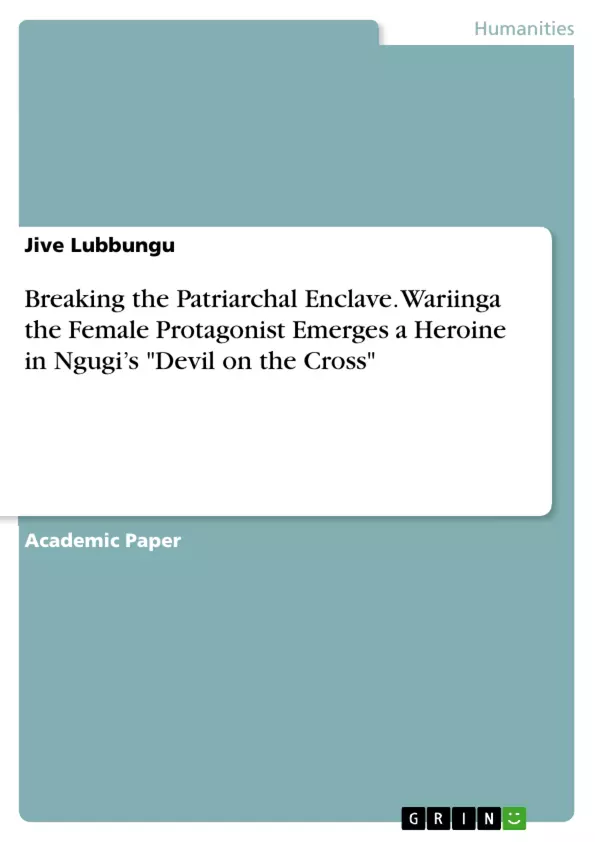This paper addresses the challenges that women are exposed to at the hands of men. Guided by feminist theory, this paper projects Wariinga, a woman who breaks the male chauvinistic strongholds and educates herself, acquires an education with professional qualifications. She first studies typewriting and later mechanical engineering and finds work as a mechanic, which is a male dominated area. She stands against men’s sexual advances and takes charge of herself and her world. She evolves into a new, dynamic character, determined to assert her strength squarely on her hunters who hitherto viewed her as a bounty. She shoots her former paramour and counters the men who had earlier tormented her with a gun, a weapon usually associated with masculine power. Equally, women in Zambia and elsewhere in the globe can become the Wariinga in the Devil on the Cross by shaking off the male chauvinistic yoke by learning to assert themselves to bring change in their own lives and destinies and of those dependent on them.
Inhaltsverzeichnis (Table of Contents)
- Background
- Discussion
- Conclusion
Zielsetzung und Themenschwerpunkte (Objectives and Key Themes)
This paper aims to examine the challenges women face due to male dominance, using Ngugi wa Thiong'o's Devil on the Cross and the character Wariinga as a case study. It explores how Wariinga transcends traditional gender roles and asserts her independence. The paper also connects Wariinga's experiences to the broader issue of female oppression globally.
- Male dominance and its historical context
- Wariinga's journey of self-discovery and empowerment
- The portrayal of female exploitation in Kenyan society
- Wariinga's defiance of patriarchal norms and expectations
- The significance of education and professional independence for women
Zusammenfassung der Kapitel (Chapter Summaries)
Background: This chapter establishes the pervasive nature of male dominance throughout history and its ongoing impact on women. It acknowledges that while this inequality is often accepted by men, there are exceptions, like Ngugi wa Thiong'o, who recognize its harmful effects. The chapter introduces scholarly perspectives on the origins of sex roles and sexual inequality, highlighting the socio-historical factors that contribute to this imbalance. It lays the groundwork for examining how these historical and societal forces shape the experiences of women, specifically in the context of Ngugi's work.
Discussion: This chapter analyzes Wariinga's character in Ngugi wa Thiong'o's Devil on the Cross. Despite facing exploitation and abuse, Wariinga refuses to remain a victim. The chapter details her journey of self-assertion, including her pursuit of education and professional success in male-dominated fields. Wariinga's experiences highlight the problem of sexual exploitation and the systemic inequalities women face in Kenyan society. It discusses her resilience, education, and subsequent refusal of sexual advances and ultimately her pursuit of a mechanical engineering career as a direct challenge to these societal structures.
Schlüsselwörter (Keywords)
Male dominance, Women's empowerment, Patriarchy, Gender inequality, Devil on the Cross, Ngugi wa Thiong'o, Wariinga, Sexual exploitation, Postcolonial Africa, Female agency.
Frequently Asked Questions: Analyzing Female Empowerment in Ngugi wa Thiong'o's *Devil on the Cross*
What is the main focus of this academic paper?
This paper analyzes the challenges women face due to male dominance, using Ngugi wa Thiong'o's novel Devil on the Cross and the character Wariinga as a primary case study. It examines how Wariinga transcends traditional gender roles and asserts her independence, connecting her experiences to broader issues of female oppression globally.
What are the key themes explored in the paper?
The key themes include male dominance and its historical context, Wariinga's journey of self-discovery and empowerment, the portrayal of female exploitation in Kenyan society, Wariinga's defiance of patriarchal norms, and the significance of education and professional independence for women's empowerment.
What is the structure of the paper?
The paper is structured into three main sections: Background, Discussion, and Conclusion. The Background section establishes the historical context of male dominance and its impact on women. The Discussion section analyzes Wariinga's character and her journey of self-assertion. The Conclusion (not explicitly detailed in the preview) would likely summarize the findings and offer concluding thoughts.
How is Wariinga's character used in the analysis?
Wariinga serves as a case study to illustrate how women resist and overcome patriarchal oppression. The paper details her pursuit of education and professional success in male-dominated fields as a direct challenge to societal structures and expectations. Her resilience and refusal of sexual advances are highlighted.
What is the significance of Wariinga's actions?
Wariinga's defiance of patriarchal norms and her pursuit of a mechanical engineering career are presented as acts of empowerment and a direct challenge to the systemic inequalities women face in Kenyan society. Her story exemplifies female agency and the importance of education and professional independence in achieving empowerment.
What historical and societal factors are considered?
The paper considers the pervasive nature of male dominance throughout history and its continuing impact on women. It explores the socio-historical factors contributing to gender inequality and how these forces shape the experiences of women, particularly within the context of Ngugi wa Thiong'o's work.
What are the key words associated with this paper?
Key words include: Male dominance, Women's empowerment, Patriarchy, Gender inequality, Devil on the Cross, Ngugi wa Thiong'o, Wariinga, Sexual exploitation, Postcolonial Africa, Female agency.
- Arbeit zitieren
- Jive Lubbungu (Autor:in), 2021, Breaking the Patriarchal Enclave. Wariinga the Female Protagonist Emerges a Heroine in Ngugi’s "Devil on the Cross", München, GRIN Verlag, https://www.grin.com/document/1038919



